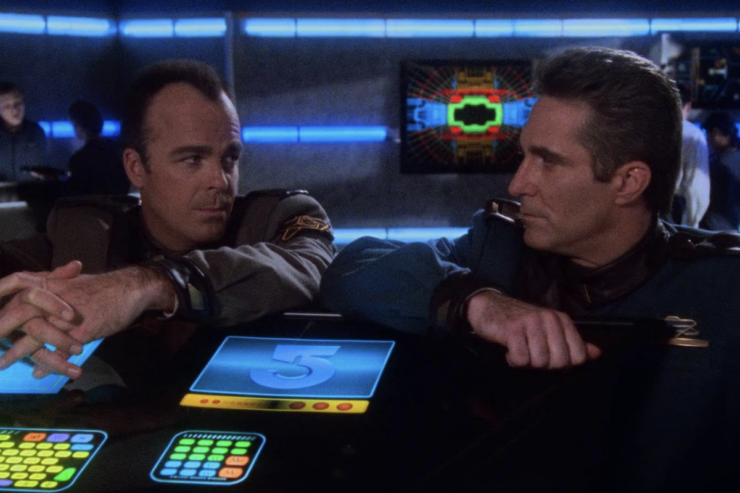“By Any Means Necessary”
Written by Kathryn M. Drennan
Directed by Jim Johnston
Season 1, Episode 12
Production episode 114
Original air date: May 11, 1994
It was the dawn of the third age… B5 is having a traffic jam, as there are too many ships wanting to dock and not enough space, too few workers, and malfunctioning equipment. However, a Narn ship, the Tal’Quith, insists on docking immediately, as it has perishable cargo. Ivanova squeezes the Tal’Quith in, but a malfunction leads to another ship departing at the same time. The Tal’Quith captain panics, ignore’s Ivanova’s instructions, and there’s a big crash that kills one worker who is blown out into space, and badly injures two more, who are barely rescued by the dockworkers. Unfortunately, one of the people they rescue—Albert Delvientos, the brother of Eduardo Delvientos, one of the forepersons—is DOA.
The perishable cargo is a G’Quan Eth—a flower that is used in a sacred ritual to Narn who worship G’Quan, of whom G’Kar is one—and it was lost in the crash. G’Kar is pissed and demands reparations, but the head of the dockworkers’ union, Neeoma Connoly, refuses to accept blame, as they’re understaffed, the equipment malfunctions half the time, and they’ve had to work extra shifts without a break. Garibaldi bolsters her argument when he announces that the culprit were some chips that malfunctioned and blew out. The equipment is substandard, and it cost two people their lives.
G’Kar is distraught, as Na’Toth regretfully informs him that there’s no way a fresh G’Quan Eth can be sent in time for the ritual. However, there’s good news and bad news. The good is that there is one on the station. The bad is that Mollari owns it.
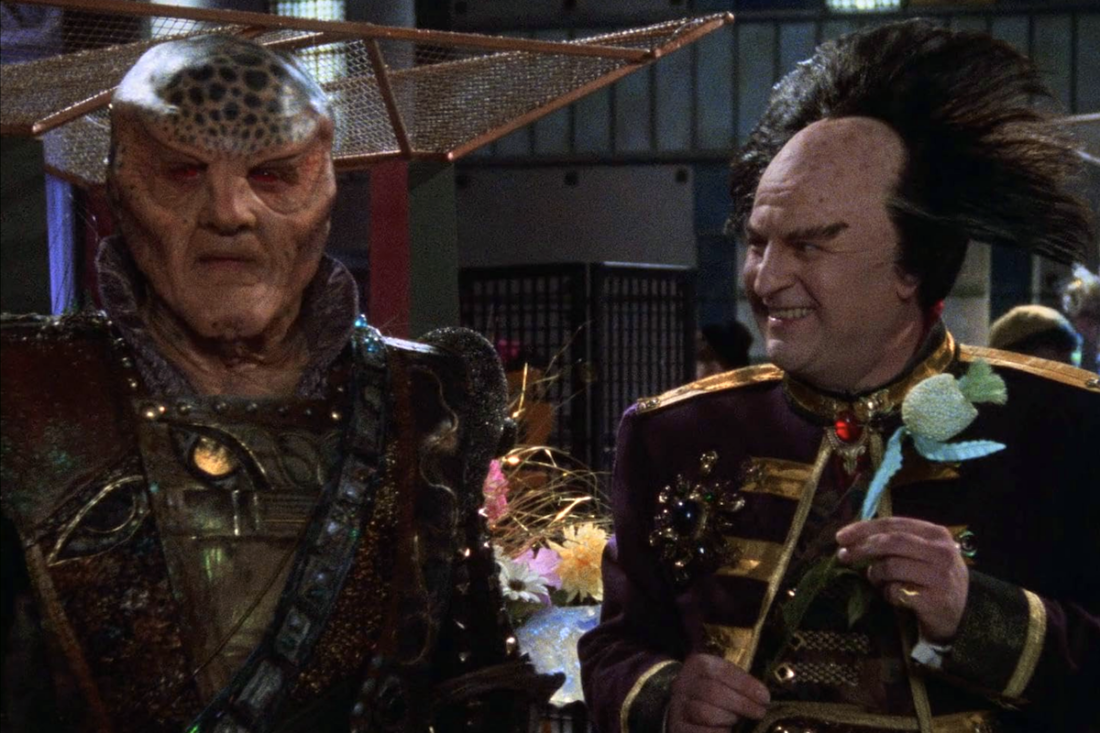
Sinclair speaks to Senator Hidoshi, who is of no help. The workers signed a contract, so they’re not entitled to any of the things Connoly says they need because that’s not in the contract. And going on strike is apparently illegal, so that isn’t an option. Hidoshi just tells Sinclair to deal with it.
The dockworkers all start calling in sick, with the sick-out being an obvious prelude to a strike. The “sick” workers are gathered in a loading bay to discuss strategy. Garibaldi shows up to escort Connoly to talk to Sinclair.
Sinclair passes on the senate’s complete lack of interest in helping, and also reminds Connoly that they could invoke the Rush Act. Connoly says she’ll call that bluff, as invoking that draconian law would turn public opinion squarely on the dockworkers’ side. And she won’t let her people continue to work in unsafe conditions.
Going back to Hidoshi, the senator offers to send a well-regarded negotiator, Orin Zento—and he’ll have the power to invoke the Rush Act if negotiations go badly.
G’Kar goes begging to Mollari, who enjoys watching G’Kar squirm. Mollari points out that the flower, when crushed, is a powerful narcotic that he enjoys. G’Kar is disgusted by that notion.
Mollari asks an absurdly high price for the G’Quan Eth, which G’Kar—reluctantly and bitching and moaning about it the entire time—goes off to gather. However, by the time he pulls the cash together, Mollari says he’s changed his mind, and he won’t sell it for any price. At this point the other shoe drops: Mollari has not forgiven the Narn in general or G’Kar in particular for the invasion of Ragesh III or the treatment of his nephew.
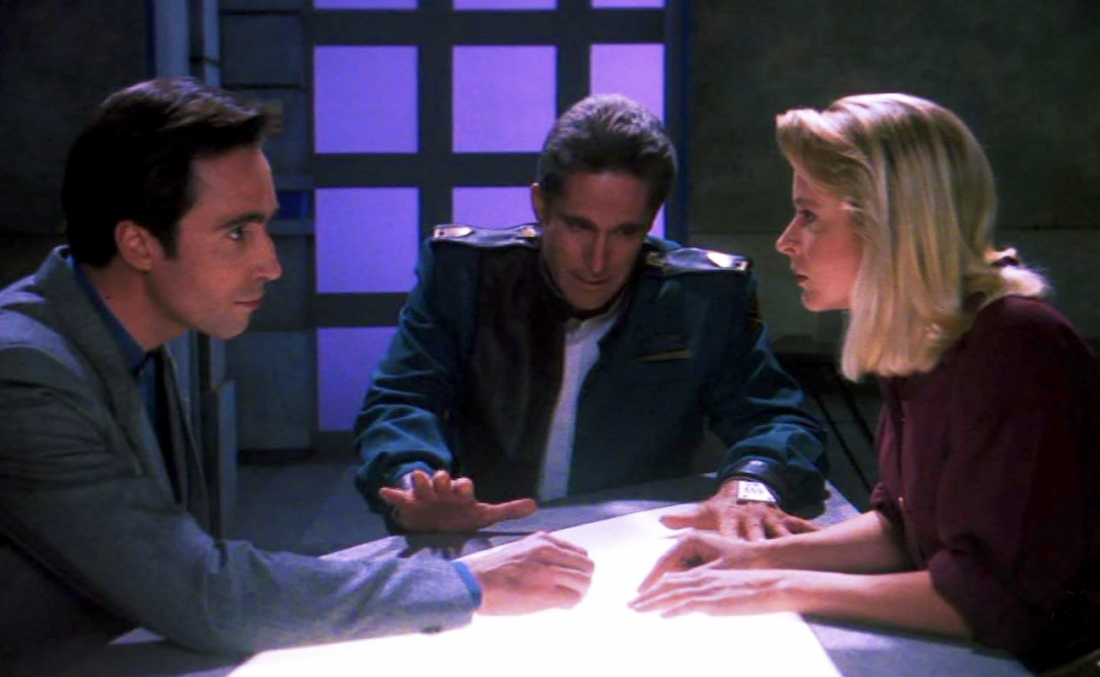
Zento arrives, but his “negotiating” consists of the same stonewalling Hidoshi did to Sinclair: there’s no money, you signed a contract, suck it up, or it’s the Rush Act for you. Tensions run high, and Sinclair declares a recess before the dockworkers string Zento up.
The next morning, Zento angrily informs Sinclair that the dockworkers have gone on strike, and also G’Kar demands an immediate meeting with Sinclair. The Narn ambassador explains the significance of the G’Quan Eth and how Mollari is putting the screws to him. Sinclair promises to talk to Mollari, but that’s the best he can offer.
The meeting with Zento and the dockworkers goes poorly as well, with Zento promising to have confirmation of the Rush Act within the hour and with Connoly not budging. Zento tells Sinclair to have security ready to make arrests as soon as word comes in from the senate.
Sinclair is ambushed in CnC by Mary Ann Cramer of ISN, who wants a quote about the strike, and by Mollari, who accuses G’Kar of stealing a statue from the Centauri temple, which G’Kar denies knowing anything about, even though everyone on the station knows he did it. Sinclair has Ivanova throw all three of them out.
Hidoshi then tells Sinclair that the Rush Act is now in effect, and the commander reluctantly tells Garibaldi to have his people head to the docks in riot gear.
He then takes Zento down to meet with Connoly and the rest, gets multiple confirmations from Zento that the Rush Act gives Sinclair latitude to end the strike by any means necessary, and then uses the following means to do so: diverting money from the military budget to meet the dockworkers’ demands, and also to grant amnesty to all the dockworkers for any illegal actions they took during the recent negotiations.
Zento is livid, as this is not the spirit of the law. But Sinclair is 100% within the letter of the law, which is all that matters. The dockworkers all happily go to work.
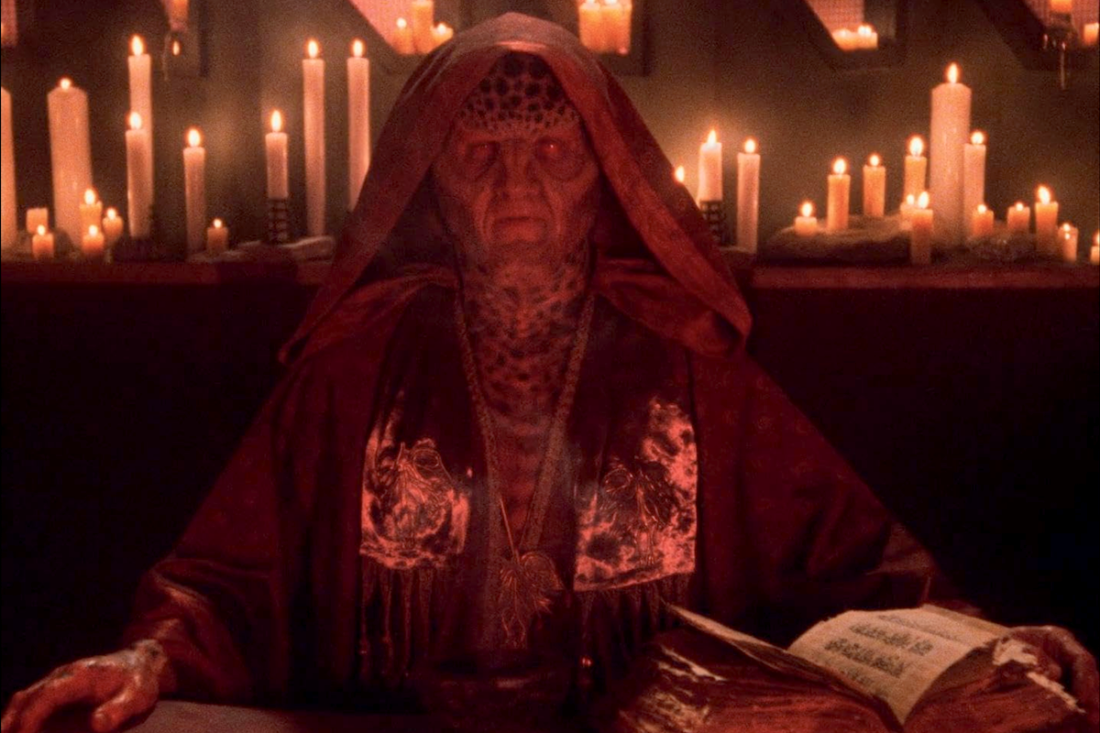
Sinclair meets with G’Kar and Mollari. He demands that G’Kar return the statue (G’Kar continues to deny knowing anything about it), but also orders Mollari to hand over the G’Quan Eth, as it’s a controlled substance. Mollari agrees and leaves. G’Kar is distraught, as the time for the ritual has passed; Mollari knows this, which is why he agreed to turn the flower over. The ritual must be performed when the sun rises above a particular mountain. Sinclair points out that the Narn homeworld is ten light-years away, so the light from the sunrise a decade ago is only just hitting the station. G’Kar is pleased, and goes off to prepare.
Hidoshi contacts Sinclair, and—with uncharacteristically genuine appreciation—congratulates him on his solution to the strike. He also warns Sinclair that he’s made some enemies with his actions: Zento, for one, and his friends in the senate for another. Sinclair is unconcerned, figuring they can get in line with all his other enemies.
Nothing’s the same anymore. Sinclair goes for the hat trick, solving three unsolvable problems with clever solutions: stopping the strike peacefully and benevolently, getting the G’Quan Eth back from Mollari, and coming up with a way for G’Kar to celebrate his religion.
Ivanova is God. Ivanova’s streak of kicking people out of CnC continues—in fact, it’s the second time she’s kicked Cramer out!
The houshold god of frustration. Garibaldi is baited by the dockworkers, who are angry at him for not supporting them, as he’s blue-collar like the rest of them. The security chief refuses to rise to the bait, though he also shows restraint when ordered to arrest the workers.
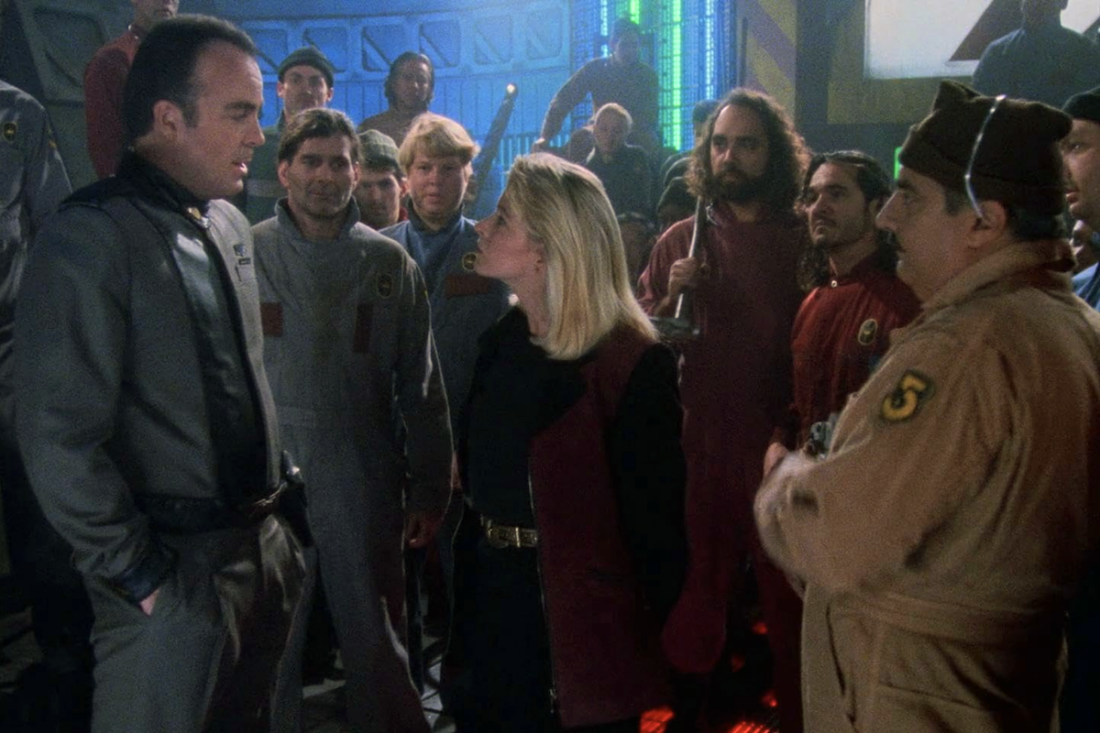
In the glorious days of the Centauri Republic… Mollari takes great glee is tormenting G’Kar with the G’Quan Eth (I particularly love his jaunty wave to G’Kar just as the latter is informed that Mollari owns one of the flowers). At first it seems to be just one enemy tweaking another, but his litany about Ragesh III makes it clear that it runs deeper than that.
Though it take a thousand years, we will be free. G’Kar’s religious beliefs, and devotion to G’Quan, is first seen here, and will continue to be an important part of his character going forward.
Looking ahead. At one point, G’Kar rants that he wants to strangle Mollari with his bare hands—which is how Mollari has already been established as foreseeing how the two of them meet their ends, strangling each other.
Welcome aboard. John Snyder returns, having previously played one of the two title characters in “Soul Hunter,” this time playing the human Zento. Katy Boyer plays Connoly, while José Rey makes the first of two appearances as Delvientos (he’ll be back in “And Now for a Word”). Aki Aleong is back from “Deathwalker” to make Hidoshi officially a recurring character; he’ll be back in “A Voice in the Wilderness, Part II.” And Patricia Healy returns from “Infection” for a second and final appearance as Cramer.
Trivial matters. This is the only script by Kathryn M. Drennan, who was the wife of show creator J. Michael Straczynski at the time. According to his online posts, Straczynski showed the opposite of favoritism, making her go through a much more grueling process than any other freelancer (which may be why this is her only script for the show). While she would not write again for the show, she did pen one of the B5 novels, To Dream in the City of Sorrows, one of the tie-in novels that was considered to be part of the overall continuity by Straczynski (which was not true of all of them).
While this Katy Boyer’s only appearance as Connoly, the character will be referenced again in her capacity as head of the dockworkers’ guild.
The Rush Act was a “tribute” to right-wing radio commentator Rush Limbaugh, who often railed against unions.
Straczynski said online in 1994 of this episode: “The premise is one that ST [Star Trek] would never, EVER do.” Two years later, Deep Space Nine proved him wrong. (To be fair, I’m sure Straczynski meant that we’d never see this with the Federation, and he was right. “Bar Association” was about the Ferengi, not humans.)
The echoes of all of our conversations.
“Fifty thousand commercial credits, in cash, in advance.”
“That’s an outrage!”
“Of course it’s an outrage! The question is: how important is your religious ceremony to you?”
—Mollari and G’Kar negotiating.
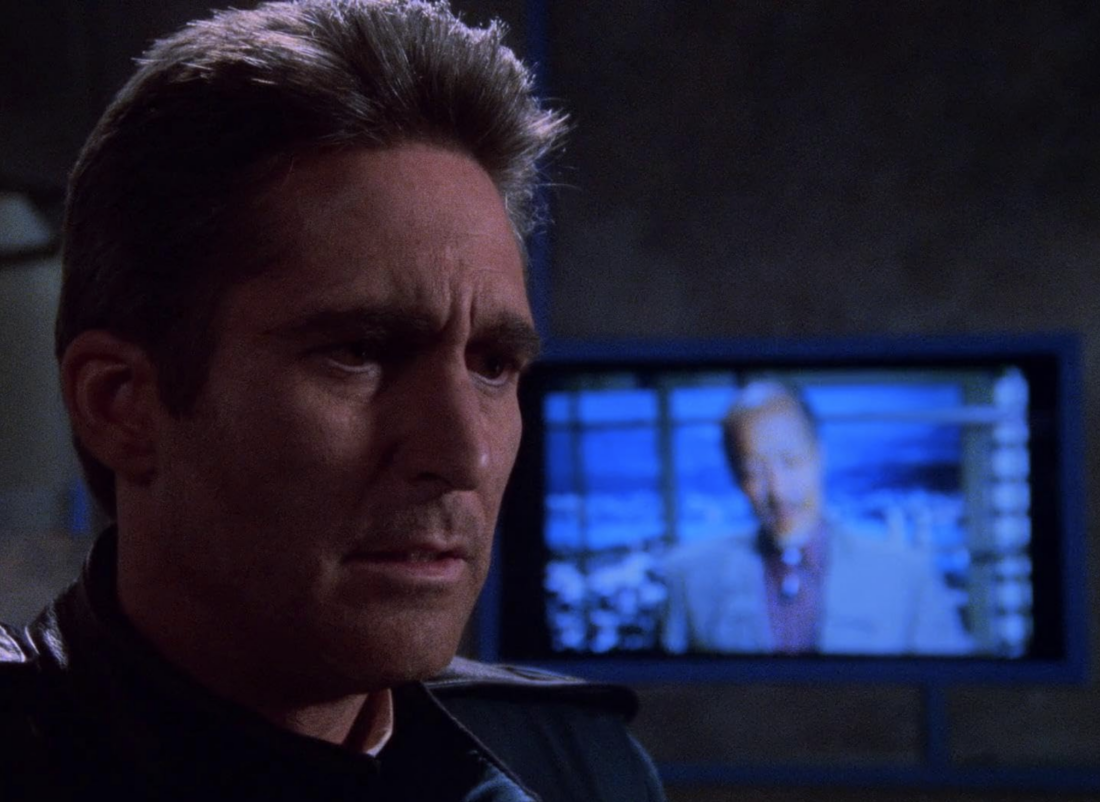
The name of the place is Babylon 5. “There are no happily-ever-afters, just new battles.” It’s funny, I have absolutely no memory of watching this one the first time back in 1994, which is disheartening only insofar as I really really really like it a lot.
Indeed, it only has one flaw, and it’s one I saw coming in the guest list: John Snyder is completely not up to the task of playing a skilled negotiator. Snyder has a very limited range, and any time a role requires charisma (here and also Star Trek: The Next Generation’s “The Masterpiece Society”), he utterly fails.
But Snyder is the episode’s only real flaw. The conflict is one that’s familiar to viewers, reminding us why unions exist, and how governments continue to do everything they can to break and damage unions. Katy Boyer does excellent work as the plucky union rep, putting a human face on the dockworkers, though a big chunk of the credit should go to scripter Kathryn M. Drennan and actors José Rey and Claudia Christian, as the exhausted banter between Ivanova and Delvientos at the top of the episode sets the tone for the rest of it, showing that B5 is a machine that is not nearly as well-oiled as it should be, but at the very least the parts work.
The B-plot is guaranteed to be wonderful because it focuses on the heart and soul of B5: Mollari and G’Kar. Peter Jurasik beautifully plays Mollari’s playful tweaking, which modulates effectively into righteous anger when the real reason for his torments comes out. Meanwhile, the scripting finally catches up to Andreas Katsulas’ performance, as G’Kar’s religious devotion adds layers to the character, and the mess that his political situation makes of his religious observances is very compelling viewing.
But the rock star here is Michael O’Hare who, for the second time in three episodes, puts in a bravura performance, aided, once again, by a great script by Drennan. You feel his frustration and his exhaustion, which makes his actions in the climax all the more wonderful. I honestly think of this as the Loophole Episode, and it’s glorious.
One of the gags Sir Arthur Conan Doyle does in his Sherlock Holmes stories is have Holmes make a deduction about someone, the person is shocked, thinking Holmes must be psychic or something, and then Holmes explains the very rational reasoning, at which point the person is no longer shocked, and actually disappointed at how simple it was for Holmes to figure all that stuff out.
That’s the vibe I got from Sinclair’s three great solutions here: they’re all actually fairly obvious and reasonable, for all that they’re truly obscure and (at least by some characters’ lights) unreasonable. In particular, I love that his solution for both obtaining the G’Quan Eth and ending the strike are going for the letter of the law over the spirit, while his suggestion to G’Kar for how to perform the ceremony is the other way around.
The vague wording of the Rush Act also reminded me of the various laws that allow business to discriminate for “religious reasons.” I’m just waiting for someone to discriminate because of their belief in Buddha or the Flying Spaghetti Monster or Satan and cite the law, which doesn’t actually say it’s only for Christians, even though that’s really what the lawmakers meant. Ditto the Rush Act—the titular phrase was meant to apply to violent solutions, but it doesn’t say that, and while sometimes in the spirit of the law is more important, the letter of the law is really the only part that’s enforceable…
Next Week: “Signs and Portents.”










